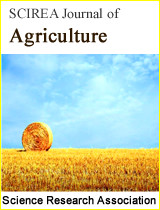SUCKERING AND SURVIVAL CAPACITY OF PINEAPPLE (Annas comosus L. Merr) PROPAGULES IN SELECTED POTTING SUBSTRATES
DOI: 457 Downloads 16078 Views
Author(s)
Abstract
A potted experiment was conducted in the greenhouse unit of the Department of Crop Science, University of Calabar, Nigeria to determine the suckering capacity of different sizes of pineapple (Ananas comosus L. Merrill) crown suckers using different potting substrates. Three sizes of the crown suckers (Whole, ½, ¼ and 1/8) and three potting substrates (Sawdust, Topsoil and a 50:50 mixture of Sawdust and Topsoil) were laid out in a 3 X 4 factorial experiment laid out in a randomized complete block design with three replicates at five plants per replication. Growth parameters evaluated were survival percentage, number of plantlets per plant, number of leaves per plant, leaf area (cm2), number of roots per plant and root length (cm). Result obtained indicated that whole and half suckers all survived in all the media while the mortality rates were 22.7 % for the 1/8 suckers in the sawdust substrate, whereas 11.1 and 44.5 % mortality rates were recorded for the quarter and 1/8 suckers respectively in the topsoil medium. All split crowns showed enhanced suckering capacity and produced significantly (p = 0.05) more suckers than the control. Whole crowns generated only one new sucker per crown but splitting the crown into two, four or eight portions generated 6, 12 and 17 new suckers per crown respectively. Significant propagule size X potting substrate interaction on root proliferation and elongation in the sawdust medium indicates favourable growth conditions provided by the potting substrate.
Keywords
Ananas comosus, potting substrate, propagule size, sucker survival, suckering capacity.
Cite this paper
Shiyam, JO, Binang, WB, Obiefuna, JC,
SUCKERING AND SURVIVAL CAPACITY OF PINEAPPLE (Annas comosus L. Merr) PROPAGULES IN SELECTED POTTING SUBSTRATES
, SCIREA Journal of Agriculture.
Volume 1, Issue 1, October 2016 | PP. 107-117.
References
| [ 1 ] | I.S. Usman, M.M. Abdulmalik, L.A. Sani and A.S. Muhammad. “Development of an protocol for micropropagation of pineapple (Ananas comosus L. Merril var. Smooth Cayenne)”. Afr. J. Agric. Res. Vol. 8 No.18, 2003, pp. 2053 – 2056 |
| [ 2 ] | C.D. Geo and F. Leal. “Chapter 2: Morphology, Anatomy and Taxanomy. In: Bartholomew,DP, Paul, RE and Kohrbach (eds)”. The pineapple: Botany, Production and Uses. ABL Publishing, Wallingford, U.K. 2013, p21 |
| [ 3 ] | FAOSTAT. “Pineapple production 2010”. FAOSTAT data 2010. FAO Rome. 2012 |
| [ 4 ] | FAO/World Bank. “Production statistics on pineapple data: An analysis case of pineapple” FAO, Rome. 1999 |
| [ 5 ] | A.A. Abdul-Soad and E.S. Boshra. ‘’An improved protocol for the micropropagation of pineapple (Ananas comosus L. Merril)” Assuit J. Agric. Sci,, Vol. 37 No. 3, 2006, pp. 13 – 30 |
| [ 6 ] | J.U. Agogbua and J.O. Osuji. “Split crown technique for mass propagation of Smooth Cayenne pineapple in South- South Nigeria” Afr. J. Plant Sci., Vol. 5 No 10, 2011, pp 591 – 598 |
| [ 7 ] | J.C. Ostos, R. Lopez-Garrido, J.M. Murrillo and R. Lopez. “Substitution of peat for municipal solid waste and sewage sludge-based compost in nursery growing media: Effect on growth and nutrition of native shrub Pistacia lentiscus (L.)” Bioresource Technology, 99, 2008 pp 1793 – 1800 |
| [ 8 ] | A.C. Ucheagwu and J.C. Obiefuna. ”Systematic removal of plantlets (milking) Mirril)” National Horticultural Research Institute, Ibadan, Nigeria. 1986 |
| [ 9 ] | J. Walliser and D. Oster. “Grow organic : More than 250 tips and ideas for growing flowers, veggies, lawns and more” St Lynn’s Press, Hawai. 2013 |
| [ 10 ] | G. Muluget. (2014). “Effect of different potting mixtures on the seedling growth and survival of Albiziz gummifera and Cordia Africana”. Journal of Natural Sciences Research, Vol.4 No. 3, 2014, pp 25 - 33 |

